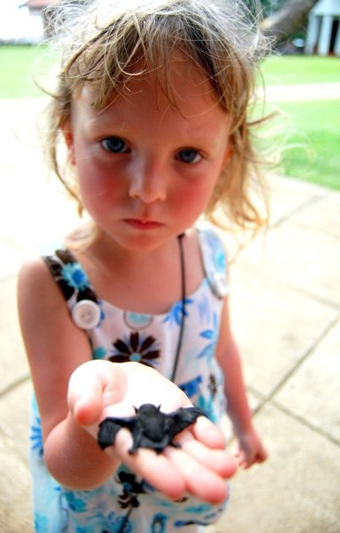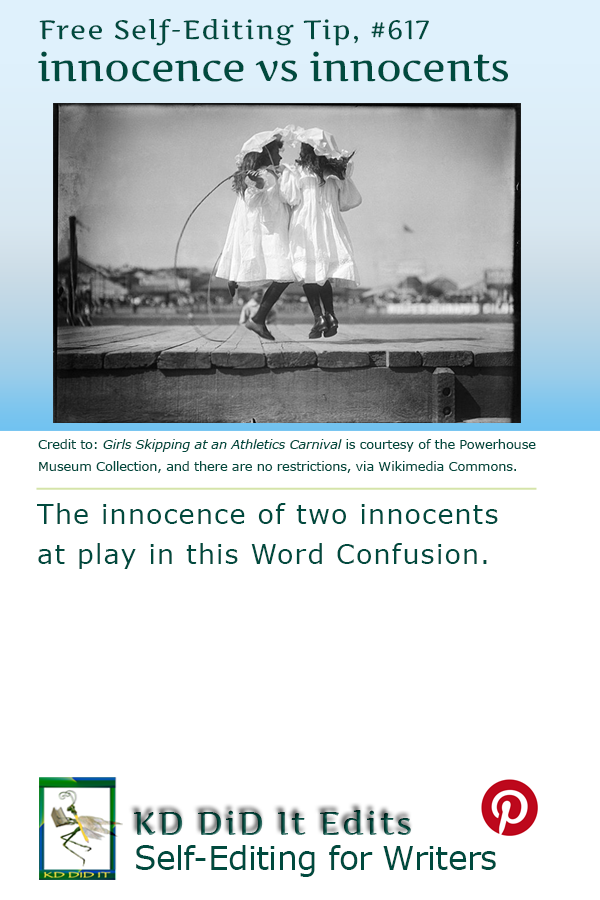Revised as of
29 Nov 2022
Ah, the innocence of the innocents lasts not long enough in this pair of heterographs.
And I wish those innocent, ahem, writers would lose their innocence about the difference between the two!
Word Confusions . . .
. . . started as my way of dealing with a professional frustration with properly spelled words that were out of context in manuscripts I was editing as well as books I was reviewing. It evolved into a sharing of information with y’all. I’m hoping you’ll share with us words that have been a bête noire for you from either end.
If you found this post on “Innocence versus Innocents” interesting, consider tweeting it to your friends. Subscribe to KD Did It, if you’d like to track this post for future updates.
| Innocence | Innocents |
|---|---|

Innocence by Hash Milhan is under the CC BY 2.0 license, via Flickr. |
Innocence is Faisal Bangla’s own work under the CC BY-SA 4.0 license, via Wikimedia Commons. — A pair of innocents . . . |
| Part of Grammar: | |
| Noun
Plural: innocence |
Morpheme: innocent
Adjective |
The state, quality, or fact of being blameless of a crime, offense, sin, or moral wrong
Simplicity
Lack of knowledge or understanding Harmlessness
Chastity A wholesome person or thing |
Adjective: Not guilty of a crime or offense
[Attrib.] Not responsible for or directly involved in an event yet suffering its consequences Free from moral wrong
Not intended to cause harm or offense
Having or showing the simplicity or naiveté of an unworldly person
Uninformed or unaware
[Postpositive; followed by of] Free (of) Noun: A person involved by chance in a situation, especially a victim of crime or war
A simpleton or idiot A guileless person A young child |
| Examples: | |
| They must prove their innocence.
The healthy bloom in her cheeks gave her an aura of innocence. They’d avenge assaults on her innocence by others. She knew the gift had been chosen in all innocence. The prisoner proved his innocence. |
Adjective: It was the arbitrary execution of an innocent man. He was innocent of any fraud. He was a man innocent of war’s cruelties. The street was quite innocent of bookstores. Oh my god, he was just an innocent bystander. It was such a horror, such an innocent child to suffer so. She is a poor, innocent young creature. C’mon, it was an innocent mistake. He gave an innocent misrepresentation. It’s all innocent fun. Geez, it’s a law innocent of merit. It was sad how innocent he was of all knowledge of history. Noun: They are prepared to kill or maim innocents in pursuit of a cause. Archeologists, biblical scholars, and psychiatrists have analyzed Herod the Great to determine if he truly was responsible for The Massacre of the Innocents (Franz). |
| Derivatives: | |
| Noun: innocency [archaic], superinnocence | Adjective: quasi-innocent, superinnocent Adverb: innocently, quasi-innocently, superinnocently |
| History of the Word: | |
| Mid-14th century Middle English meaning freedom from guilt is from the 12th century Old French inocence meaning innocence, purity, chastity, which is from the Latin innocentia, which is from innocent- meaning not harming or innocens meaning harmless, blameless and based on nocere meaning injure. | Middle English from the Old French, or from the Latin innocent- meaning not harming, from in- (not) + nocere (to hurt). |
C’mon, get it out of your system, bitch, whine, moan . . . which words are your pet peeves? Also, please note that I try to be as accurate as I can, but mistakes happen or I miss something. Email me if you find errors, so I can fix them . . . and we’ll all benefit!
Satisfy your curiosity about other Word Confusions on its homepage or more generally explore the index of self-editing posts. You may also want to explore Book Layout & Formatting Ideas, Formatting Tips, Grammar Explanations, Linguistics, Publishing Tips, the Properly Punctuated, Writing Ideas and Resources, and Working Your Website.
Resources for Innocence vs Innocents
Apple Dictionary.com
Dictionary.com: innocence and innocent
Franz, Gordon. “The Slaughter of the Innocents: Historical Fact or Legendary Fiction?” Associates for Biblical Research. 2009. Web. 21 Nov 2017. <http://www.biblearchaeology.org/post/2009/12/08/The-Slaughter-of-the-Innocents-Historical-Fact-or-Legendary-Fiction.aspx>.
Pinterest Photo Credits:
Girls Skipping at an Athletics Carnival is courtesy of the Powerhouse Museum Collection, and there are no restrictions, via Wikimedia Commons.


